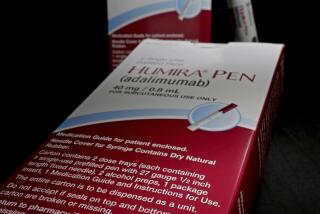Generic Heartburn Drug Hard for Some to Swallow
- Share via
CHICAGO — A generic version of blockbuster heartburn drug Prilosec is failing to soothe the stomachs of U.S. health plans and consumers, who say the knockoff is not much cheaper than the original.
After generic drug makers waged a lengthy patent war against AstraZeneca, the Anglo-Swedish maker of Prilosec, only Schwarz Pharma of Germany won the rights to sell a cheaper version in the United States. As a result, the copycat Prilosec went on the market this month for as much as 90% of the price of the prescription version -- in stark contrast to deep discounts enjoyed on typical generics, U.S. insurers and consumers said.
“We have found the generic is not living up to its promise,” said John Eadie, policy analyst at the New York Statewide Senior Action Council, which lobbies on drug cost issues.
“It’s a faux generic,” said Robert Seidman, pharmacy chief at WellPoint Health Networks Inc. of Thousand Oaks. Schwarz “could have this monopoly position for a prolonged period of time,” he added.
Some analysts expect that generic Prilosec, called omeprazole, eventually will cost 20% to 25% less than the brand-name product. But WellPoint and other major U.S. health insurers including Health Net Inc. and Humana Inc. remain skeptical.
Separately, analysts said Schwarz Pharma got off to a strong start in sales this month, capturing 13% of the market for the drug class. Three firms jockeyed to sell the generic, but plans unraveled after Schwarz alone won the legal battle to market its version of the $6-billion-a-year heartburn drug.
In an unusual twist, Schwarz will share profits with rivals Andrx Corp. and Merck & Co.
Generic Prilosec “ain’t that cheap; it’s going on the third tier,” meaning it could cost consumers as much as $40, said David Olson, a spokesman at Health Net, which with 2.5 million members is one of California’s biggest health plans.
Non-brand Prilosec will cost Humana customers as much as $50, a spokesman for the Louisville, Ky.-based firm said.
A CVS Corp. pharmacy in Chicago says it sells a 90-day supply of generic Prilosec for $113, compared with $126 for the brand name -- about a 10% discount.
Schwarz said it was discounting the pill by 20% to 30%. The list price is $2.88 per pill, spokeswoman Antje Witte said.
The difference arises in part because the companies negotiating prices for drugs with HMOs -- known as prescription benefits managers, or PBMs -- take a slice, said Linda Cahn, a lawyer who works on health issues.
When a health maintenance organization such as WellPoint does its own negotiating, it gets those trimmings.
“These guys don’t pay list prices; they make deals,” said Cahn, who is representing corporations suing Merck’s Medco Health, one of the biggest PBMs. “PBMs and intermediaries buy cheap at undisclosed prices and sell far higher.”
Cahn is among critics questioning deals between PBMs and brand-name manufacturers, charging that PBMs cherry-pick drugs in exchange for kickbacks from drug makers.
Schwarz’s Witte suggested that out-of-whack supply and demand skews the market, noting: “It depends on a lot of factors, including court decisions and only one player being in the market.”
As it stands, Schwarz’s U.S. unit cannot make enough of the product to meet demand, she said.
Prescription drugs are among the biggest contributors to double-digit-percentage medical inflation. Ulcer and heartburn drugs make up about 10% of health plans’ prescription drug costs, WellPoint’s Seidman said.
Insurers and employers had hoped that Prilosec would follow generic Prozac and Claritin in saving them big bucks. But it appears they may have to wait.
AstraZeneca’s patent expires in 2007, so Schwarz Pharma potentially could have sole selling rights until then, Witte said.
*
Additional reporting by Reuters’ Jed Seltzer.
More to Read
Inside the business of entertainment
The Wide Shot brings you news, analysis and insights on everything from streaming wars to production — and what it all means for the future.
You may occasionally receive promotional content from the Los Angeles Times.










